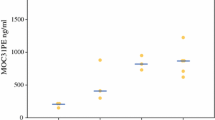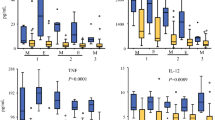Abstract
Background
Heated intraperitoneal chemotherapy (HIPEC) was shown to induce immunogenicity of peritoneal metastases from colorectal cancer (PM-CRC) by induction of immunogenic cell death. We aimed to explore whether the addition of a checkpoint inhibitor would augment the effect of HIPEC in an experimental murine model of PM-CRC.
Methods
PM-CRC was established in C57BL mice by intraperitoneal inoculation of MC38 colon cancer cells. HIPEC was administered using the closed technique with mitomycin C (MMC). Clinical and immunological parameters were compared between animals treated with HIPEC alone and those treated with HIPEC + anti-programmed death receptor-1 (aPD-1).
Results
MMC-based HIPEC increased the overall survival of animals compared with sham-treated animals (22.8; 95% confidence interval [CI] 21.14–24.53 vs. 18.9 days; 95% CI 17.6–20.3, p < 0.001). The extent of peritoneal disease as measured by the modified peritoneal carcinomatosis index was also reduced by HIPEC. This clinical benefit was accompanied by increased infiltration of CD8+, CD68+, and CD20+ cells into tumor metastases in HIPEC-treated animals compared with sham-treated animals. We identified heat shock protein (HSP) 90 as a potential immunogenic cell death protein whose expression is increased under HIPEC conditions (fold change: 2.37 ± 1.5 vs. 1 without HIPEC, p < 0.05). Combined HIPEC + PD-1 treatment ameliorated survival compared with HIPEC alone and sham treatment (24.66; 95% CI 20.13–29.2 vs. 19; 95% CI 15.85–22.14 and 14.33 days; 95% CI 9.6–19.04, respectively; p = 0.008). This clinical effect was accompanied by increased CD8+ tumor infiltration.
Conclusions
HIPEC induced the expression of immunogenic cell death signals that can support an anti-tumor immune response. This response can be further exploited by a checkpoint inhibitor.





Similar content being viewed by others
References
Quenet F, Elias D, Roca L, et al. Cytoreductive surgery plus hyperthermic intraperitoneal chemotherapy versus cytoreductive surgery alone for colorectal peritoneal metastases (PRODIGE 7): a multicentre, randomised, open-label, phase 3 trial. Lancet Oncol. 2021;22(2):256–66.
van de Vlasakker VCJ, Lurvink RJ, Cashin PH, et al. The impact of PRODIGE 7 on the current worldwide practice of CRS-HIPEC for colorectal peritoneal metastases: a web-based survey and 2021 statement by Peritoneal Surface Oncology Group International (PSOGI). Eur J Surg Oncol. 2021;47(11):2888–92.
Elias D, Gilly F, Boutitie F, et al. Peritoneal colorectal carcinomatosis treated with surgery and perioperative intraperitoneal chemotherapy: retrospective analysis of 523 patients from a multicentric French study. J Clin Oncol. 2010;28(1):63–8.
Baratti D, Kusamura S, Pietrantonio F, Guaglio M, Niger M, Deraco M. Progress in treatments for colorectal cancer peritoneal metastases during the years 2010–2015. A systematic review. Crit Rev Oncol Hematol. 2016;100:209–22.
Carlino MS, Larkin J, Long GV. Immune checkpoint inhibitors in melanoma. Lancet. 2021;398(10304):1002–14.
Breakstone R. Colon cancer and immunotherapy-can we go beyond microsatellite instability? Transl Gastroenterol Hepatol. 2021;6:12.
Andre T, Shiu KK, Kim TW, et al. Pembrolizumab in microsatellite-Instability-High advanced colorectal cancer. N Engl J Med. 2020;383(23):2207–18.
Maby P, Bindea G, Mlecnik B, Galon J. License to kill: microsatellite instability and immune contexture. Oncoimmunology. 2021;10(1):1905935.
Eng C, Kim TW, Bendell J, et al. Atezolizumab with or without cobimetinib versus regorafenib in previously treated metastatic colorectal cancer (IMblaze370): a multicentre, open-label, phase 3, randomised, controlled trial. Lancet Oncol. 2019;20(6):849–61.
Zhou J, Wang G, Chen Y, Wang H, Hua Y, Cai Z. Immunogenic cell death in cancer therapy: Present and emerging inducers. J Cell Mol Med. 2019;23(8):4854–65.
Fucikova J, Kepp O, Kasikova L, et al. Detection of immunogenic cell death and its relevance for cancer therapy. Cell Death Dis. 2020;11(11):1013.
Turaga K, Levine E, Barone R, et al. Consensus guidelines from The American Society of Peritoneal Surface Malignancies on standardizing the delivery of hyperthermic intraperitoneal chemotherapy (HIPEC) in colorectal cancer patients in the United States. Ann Surg Oncol. 2014;21(5):1501–5.
Wei SC, Anang NAS, Sharma R, et al. Combination anti-CTLA-4 plus anti-PD-1 checkpoint blockade utilizes cellular mechanisms partially distinct from monotherapies. Proc Natl Acad Sci U S A. 2019;116(45):22699–709.
Jacquet P, Sugarbaker PH. Clinical research methodologies in diagnosis and staging of patients with peritoneal carcinomatosis. Cancer Treat Res. 1996;82:359–74.
Nizri E, Sternbach N, Bar-David S, et al. T-Helper 1 Immune Response in Metastatic Lymph Nodes of Pancreatic Ductal Adenocarcinoma: a marker for prolonged survival. Ann Surg Oncol. 2018;25(2):475–81.
Bankhead P, Loughrey MB, Fernandez JA, et al. QuPath: Open source software for digital pathology image analysis. Sci Rep. 2017;7(1):16878.
Helderman R, Loke DR, Tanis PJ, et al. Preclinical In Vivo-Models to Investigate HIPEC; Current Methodologies and Challenges. Cancers (Basel). 2021;13(14):3430.
Lehmann K, Rickenbacher A, Jang JH, et al. New insight into hyperthermic intraperitoneal chemotherapy: induction of oxidative stress dramatically enhanced tumor killing in in vitro and in vivo models. Ann Surg. 2012;256(5):730–7 (discussion 737 738).
Zunino B, Rubio-Patino C, Villa E, et al. Hyperthermic intraperitoneal chemotherapy leads to an anticancer immune response via exposure of cell surface heat shock protein 90. Oncogene. 2016;35(2):261–8.
Durgeau A, Virk Y, Corgnac S, Mami-Chouaib F. Recent Advances in Targeting CD8 T-Cell Immunity for More Effective Cancer Immunotherapy. Front Immunol. 2018;9:14.
Martinez-Lostao L, Anel A, Pardo J. How do cytotoxic Lymphocytes kill cancer cells? Clin Cancer Res. 2015;21(22):5047–56.
Edin S, Kaprio T, Hagstrom J, et al. The Prognostic Importance of CD20(+) B lymphocytes in Colorectal Cancer and the relation to other immune cell subsets. Sci Rep. 2019;9(1):19997.
Galluzzi L, Humeau J, Buque A, Zitvogel L, Kroemer G. Immunostimulation with chemotherapy in the era of immune checkpoint inhibitors. Nat Rev Clin Oncol. 2020;17(12):725–41.
Author information
Authors and Affiliations
Corresponding author
Ethics declarations
Disclosures
Ravit Geva has received honoraria (self) from Roche, MSD, Merck, Medison, Janssen, Pfizer, and BMS, and advisory/consultancy fees from AstraZeneca, BOL Pharma, Roche, Ranium, JNJ, Bayer, and MSD; holds a leadership role with Pyxis (medical lead); has shareholder/stockholder/stock options with Pyxis (options); and has received travel/accommodation expenses from Takeda and Medison. Gilad Alon, Maya Nathanson, Shoshi Bar-David, Nadav Nevo, Asaf Aizic, Sharon Peles-Avraham, Guy Lahat and Eran Nizri have no disclosures to declare.
Additional information
Publisher's Note
Springer Nature remains neutral with regard to jurisdictional claims in published maps and institutional affiliations.
Supplementary Information
Below is the link to the electronic supplementary material.
Rights and permissions
Springer Nature or its licensor (e.g. a society or other partner) holds exclusive rights to this article under a publishing agreement with the author(s) or other rightsholder(s); author self-archiving of the accepted manuscript version of this article is solely governed by the terms of such publishing agreement and applicable law.
About this article
Cite this article
Geva, R., Alon, G., Nathanson, M. et al. PD-1 Blockade Combined with Heated Intraperitoneal Chemotherapy Improves Outcome in Experimental Peritoneal Metastases from Colonic Origin in a Murine Model. Ann Surg Oncol 30, 2657–2663 (2023). https://doi.org/10.1245/s10434-022-13025-7
Received:
Accepted:
Published:
Issue Date:
DOI: https://doi.org/10.1245/s10434-022-13025-7




